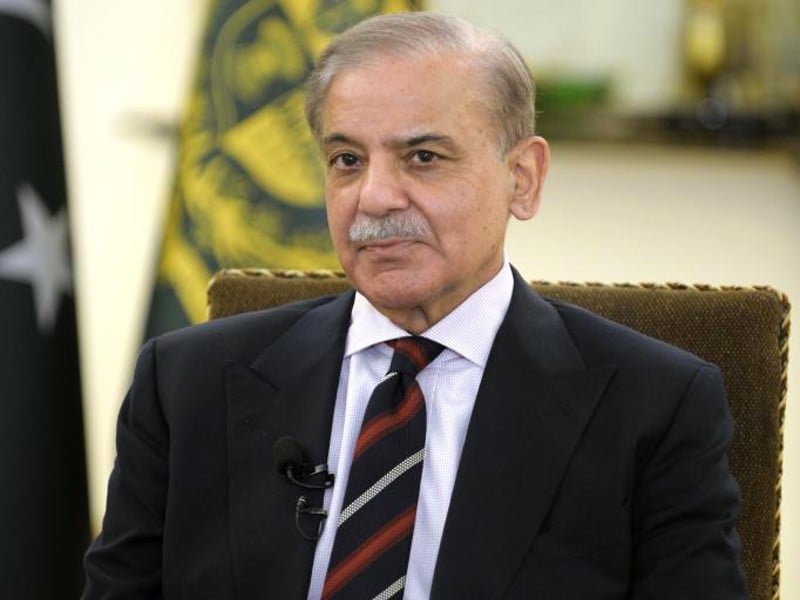ISLAMABAD
According to Prime Minister Shehbaz Sharif, Pakistan and China would march towards mutual development, prosperity, and advancement while carrying similar principles.

On March 3, Chinese President Xi Jinping wished Shehbaz well on his election to the position of prime minister of the Islamic Republic of Pakistan. Shehbaz replied by expressing gratitude to Xi for his kind words of congratulations and unwavering support for Pakistan.
“I greatly appreciate his feelings for the people of Pakistan, our friendship, and our shared cooperation,” Shehbaz stated in an Islamabad Prime Minister’s Office interview with Xinhua. “For me, it’s a very good start.”
The 73rd anniversary of China and Pakistan’s diplomatic relations’ founding is observed this year. According to Shehbaz, the leaders of China and Pakistan have consistently fostered and advanced their bilateral friendship over the previous seventy-plus years. Together, the two nations have grown into reliable and strategic allies, bonded by a special kind of brotherhood known as “iron brothers” that has endured over time.
“This friendship now must achieve higher heights,” he stated.
Shehbaz, 73, has vast experience in regional economic growth and governance, having held the position for three terms as Punjab province’s chief minister. Speaking about China’s modernization, Shehbaz suggested Pakistan follow China’s lead.
The prime minister remarked, “It is a great success model and success story,” recalling the ways in which successive generations of Chinese leaders have inspired their people to accomplish extraordinary feats of development, bringing hundreds of millions of people out of poverty and giving a sizable portion of the rural populace access to jobs, healthcare, and education.
According to Shehbaz, Chinese modernization has produced industries and growth hubs that are competitive in the international market. “Despite challenges in recent years, China’s growth has still gone steadily compared to other countries, which is a remarkable achievement,” he stated.
The prime minister claimed that Pakistan might benefit from the concept in order to reduce poverty, increase employment opportunities for young people, and promote small- and medium-sized business ventures in the fields of agriculture, industry, and information technology in both urban and rural areas.
Shehbaz stated that Pakistan completely and firmly supports both the Global Security Initiative and the Global Development Initiative, noting that Pakistan is one of the first countries to join the Group of Friends of the Global Development Initiative (GDI). He thinks these kinds of projects will make the bonds between the world’s communities stronger.
Shehbaz pointed out that the Belt and Road Initiative’s initiatives cut across continents and helped to alleviate poverty, reduce hunger, facilitate investment, and advance health and education.
“There couldn’t have been a better model for forging global societies together,” Shehbaz stated.
Shehbaz’s maiden parliamentary speech following reelection highlighted the China-Pakistan Economic Corridor (CPEC), a major project under the Belt and Road Initiative.
According to Shehbaz, Pakistan is now prepared to proceed with the second phase of the CPEC, which will use the corridor to advance agricultural and technical advancement.
According to Shehbaz, Pakistan has formed the Special Investment Facilitation Council, which will reduce bureaucracy and eliminate inefficiencies and delays for CPEC projects.
In addition, the nation intends to develop export zones and industrial parks. It also welcomes Chinese joint ventures in industries like steel and textiles that combine Chinese technology with Pakistani labour resources.
“Through those joint ventures, high-quality products in agriculture, industry, IT, etc., are produced to create hundreds of thousands of jobs and wealth and increase our production and exports,” he stated.
“China has been extremely helpful in promoting Pakistan’s economic progress, and CPEC has played a very important role, which we really appreciate deeply,” stated Shehbaz.
According to the prime minister, Pakistan is trying to electrify its transport network in order to reduce the cost of fuel imports and divert funds towards development. The nation also intends to purchase sustainable energy technologies from other nations, including China.
Shehbaz declared that he was eager to return to China, referring to the custom of Pakistan’s newly elected leaders visiting China following their inauguration. He declared, “China is our second home.”
“We made solemn commitments that we would work together,” stated Shehbaz, “and we would be together through thick and thin.”










































